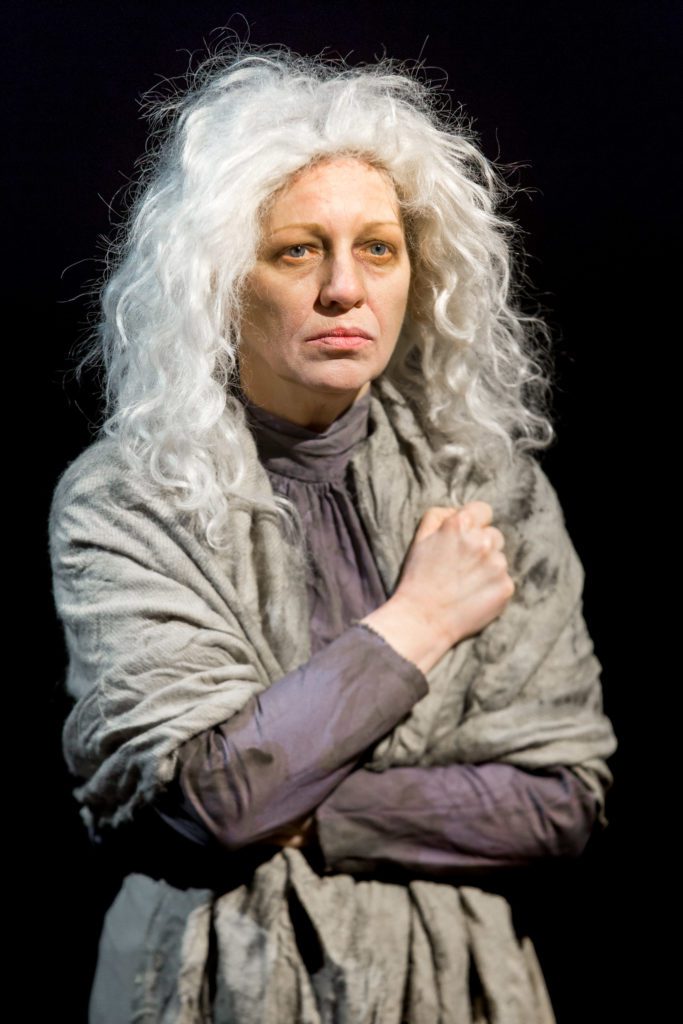Scena Returns to ‘Beckett Trio’
By • March 22, 2018 0 855

People say you can’t go home again, or travel backwards in time. But you can, you can.
Scena Theatre, now in its 30th anniversary season, is doing so with a potent, sparse production of three short plays by Samuel Beckett, the master of minimalism. The plays — “Footfalls,” “Not I” and the wrenching “Rockaby” — are powerfully emotional works, marked by brevity in length and language, but also by poetry, bitter humor and fearless explorations of what it means to be human.
In the great tradition of upstart, edgy theater companies that were providing a growing Washington theater community with work rarely seen elsewhere, Scena presented “Havel/Beckett” in 1991 in a Dupont Circle dance studio.
“That wasn’t the first time we’d done Beckett,” said Artistic Director Robert McNamara, whose Scena company now performs mostly at the Atlas Performing Arts Center on H Street NE. Scena began its life with a 1987 season that including Beckett’s “Endgame. There was a Beckett Festival in 1990 at what was then the home of Woolly Mammoth at 14th and Church Streets NW and, in 1999, 13 plays by Beckett were performed at the Warehouse Theatre on 7th Street NW.
An Irishman who wrote in French, Beckett was a major part of McNamara’s creative, intellectual and probably personal life. “He’s one of the greatest playwrights of the 20th century, and continues to engage audiences, and engage artists, all over the world, but particularly in Europe, Eastern Europe and the United States,” said McNamara.
With the presence of “The Beckett Trio,” running through April 8 at Atlas, Washington theatergoers and fans of Beckett and his brand of avant-garde now have a small boomlet of Beckett works. Ireland’s Druid Theatre Company is bringing its production of the classic — yes, we said classic — “Waiting for Godot” to the Shakespeare Theatre Company from April 17 to May 20.
Beckett’s bleaker productions — the plays “Endgame,” “Krapp’s Last Tape” and the wondrous “Happy Days,” along with countless short pieces and the novels “Molloy,” “Malone Dies” and “The Unnameable” — share a common outlook on life, not so much cynical as emotionally wrenching and shredded of hope. Often obscure, they are not uniformly popular. But “Godot,” for a multitude of reasons, is a work upon which many master theses and books have been written.
“Godot” put Beckett and his life and visage into the realm of icon and legend, in particular that white, expertly combed mane of hair, the razor-sharp face and look, all of which made him seem a prophet. The main characters in “Godot,” the bums Vladimir and Estragon, have been played by Steve Martin and Robin Williams and by Patrick Stewart and Ian McKellen.
The characters — the two homeless men, who often yearn to but never do commit suicide; a wandering master-slave duo, Pozzo and Lucky; and a nameless boy — are the kind of characters who inhabit not only their ragged costumes but the dreams of audiences. We wait with Vladimir and Estragon, but Godot never comes.
You’ll find Beckett’s characters, moods, views and visions in all of his plays, including the short ones, some of them very short indeed.
“We’ve done many of the short plays, including one that’s the shortest play in existence,” said McNamara. “‘Godot’ and much of Beckett’s work includes a lot of humor. I think people come to him because he describes our condition and looks at it boldly. But yes, he’s funny, too. The plays are remarkably full of life, even if they’re truly dark.”
Peter Brook, the giant former director of the Royal Shakespeare Company (“Marat/Sade”), a friend of Beckett’s, explained in a 2011 interview with this writer that there are two Becketts. “I think that people think of him as this bleak, terrifying writer, this tragic Rasputin, full of pessimism and hopelessness and despair. But there’s a lighter, a warm man, witty and funny.”
Brook brought “Fragments,” a group of five short plays, including “Rockaby,” to the Kennedy Center in 2000.
All three plays in “The Beckett Trio” star Nanna Ingvarsson, a Helen Hayes Award-winning Washington actress (she is married to actor Brian Hemmingsen). In “Rockaby,” she is a dying woman going over memories of her life, sitting in a rocking chair, rocking back and forth. It’s about a life lived and about dying, about ghosts.
“It’s different now,” McNamara said. “That happens to plays as time goes by. We’re in a different place. The times are different.”
But this theatrical adventurer, who finds new plays in Europe and presents them in Washington and elsewhere, always comes back to Beckett. That’s when you guess that Beckett is both ancient and modern, timeless. In the presence of McNamara’s living Beckett (he died in 1989), seeing that implacable rocking chair and the woman’s intonations, we are in the presence of the now and the future, the here and then and soon enough.

